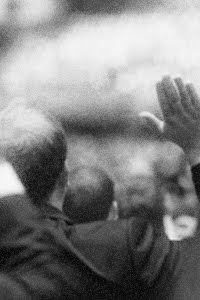Some time ago, I became involved in a discussion involving the way local priesthood leadership was dealing with a particular issue. Though I disagreed, I believe I was offering constructive feedback as to why the approach was doing more harm than good. One of the main responses was along the lines, "this came from the bishopric, and they are our priesthood leaders with stewardship, therefore this is inspired by the Spirit," with the connotation that disagreement with the method is disagreement with God.
I have spent a great deal of thought on the nature of stewardship, priesthood authority, and agency. I think that many of us may have a faulty understanding of the nature of priesthood power, and what it means to sustain a person in their calling.
When I raise my hand to sustain a person in their calling, I am not indicating that I will never disagree with that person. When I sustain, I mean I will support. That means I offer all my available time, as well as all my available intellect and compassion, to supporting that person in their calling. There are a few callings, such as pack leader, which I do not sustain no matter who holds that calling. There are very few people I am not willing to sustain.
The nature of priesthood authority is wildly misunderstood. I can understand why the confusion happens. The Priesthood applies in different ways to two different things. First, there are the offices of the Priesthood. These entail specific callings and ordainments, such as deacon, teacher, priest, elder, high priest, Patriarch, bishop, Relief Society President, temple worker, home and visiting teacher, etc. Once ordained, these offices exist until they are formally taken away. It is these offices which give the authority to administer in certain ordinances, either formal ordinances such as administering the sacrament, baptizing, officiating in the temple, or sealing; or informal ordinances such as ministering to the spiritual and temporal needs of specific groups of people in the ward.
There is also the power of the Priesthood. This power doesn't exist if it is not wielded righteously. It doesn't matter to which priesthood offices you have been ordained, if you are attempting to exert control upon others, you are not operating by the power of the Priesthood. This power in the Priesthood operates upon the same principles as the power in the Holy Ghost. Indeed, without the companionship of the Holy Ghost, attempts to wield priesthood power will fail. I would even go so far as to suppose that the power of the Holy Ghost is one aspect of priesthood power. The power of the Priesthood is a power of service, of ministry. It enables the wielder to use the gifts of the Spirit with authority. Every time we make covenants and receive ordinances, we gain greater access to this power (which we can choose to use or ignore.)
To understand priesthood power and authority, it is vital to also understand certain basic principles of the Gospel, particularly agency. No one can have stewardship over another's agency. No matter what a person with stewardship over another commands an individual to do, there is never an excuse to simply follow without thought. If a relationship of trust between priesthood leader and individual has been established, there may be times when an individual may choose to follow without question for a time, but such obedience must always be based upon trust and love. If trust has not been established, if love is not shown, there can be no expectation of obedience based upon the offices or the power of the priesthood.
We follow every commandment of God because we trust that He loves us, and is working for our good. There can be no less in the relationships created by the authority of His Priesthood. Often, priesthood leaders don't see the whole picture, or don't understand the effects of their decisions on those within their stewardship.
In such cases, it is not sustaining one's priesthood leader to allow them to continue in ignorance. It is completely sustaining them, helping them fulfill their callings to the best of your ability, to charitably share your opinions and perspective. It is part of their priesthood obligation to listen to you with charity, to take you seriously. When they do, if they then decide to still continue on their previous course, it is with the companionship of the Holy Ghost and under full authority and in the power of the Priesthood.
This is the model for a righteous priesthood dynamic. And every time I raise my hand to sustain, I truly dedicate my time, talents and all with which the Lord has blessed me to the support of that person in that calling, including the talent of intelligence and perspective.
Continue reading at the original source →
Show all posts from
Go to Previous
Shortcut Keys: K or P
Shortcut Keys: K or P
Go to Next
Shortcut Key: J or N
Shortcut Key: J or N
Close
Shortcut Key: Esc
Shortcut Key: Esc
Blogs about Latter-day Saint Topics
Blogs by Mormons on Other Topics
Blogs by Full-Time Mormon Missionaries
Content from Official Church Feeds
Audio and Video from
General Conferences
General Conferences




